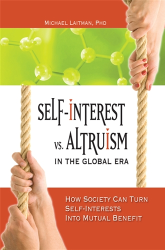The Real Reason Why People Hate to Collaborate
As we can see from multiple psychological and sociological studies, it is more rewarding to work in a group than alone. Hence, why do we not cooperate all the time? If we are made of a desire to receive and can receive more by collaborating, then why are we not collaborating? What is it about our nature that, despite the 1,200 studies that prove it is better to work together than alone, we have not thoroughly installed these methods in our education system? And why do schools (and the entire education system), media, sports, and politics still promote competitive and individualistic behavior, extolling successful individuals? Why not extol people who promote bonding and mutuality, if evidence proves that it would work to everyone’s benefit?
The reason why this is so is because in Stage Four of the development of the egoistic desire we are no longer satisfied with achieving more. Achieving more was what we wanted in Stage Three. In Stage Four, our primary desire is to achieve more than others. We want to be unique and superior, just like the Creator. Thus, we may provide hard, indisputable evidence that it is better to work together than alone, but without feeling that this is so, our egos will not succumb to the idea. In Stage Four, solutions must first satiate the ego before we can approach daily life tactics to improve our achievements.
In regard to the above paragraph, in “Peace in the World,” Baal HaSulam elaborates on our sense of uniqueness: “The nature of each and every person is to exploit the lives of all other people in the world for his own benefit. And all that he gives to another is only out of necessity; and even then there is exploitation of others in it, but it is done cunningly, so that his neighbor will not notice it and concede willingly. The reason for it,” he explains, “is that… because man’s soul extends from the Creator, who is one and Unique [referring to the single law of bestowal that creates and sustains the world]… man… feels that all the people in the world should be under his own governance and for his own private use. And this is an unbreakable law. The only difference is in people’s choices: one chooses to exploit people to satisfy lower desires, and one by obtaining government, while the third by obtaining respect. furthermore, if one could do it without much effort, he would agree to exploit the world with all three combined—wealth, government, and respect. However, he is forced to choose according to his possibilities and capabilities. This law can be called, ‘the law of singularity in man’s heart.’ No person escapes it, and each and every one takes his share in that law.”
You Can Either Be Unique and Creative Alone… Or With the Creator
On october 15, 2006, Sam Roberts of The New York Times published a story titled, “To Be Married Means to Be Outnumbered,” where he referred to a census. The story revealed that “Married couples, whose numbers have been declining for decades as a proportion of American households, have finally slipped into a minority… The American Community Survey, released… by the Census Bureau, …found that 49.7 percent [of] households in 2005 were made up of married couples… down from more than 52 percent five years earlier.” Moreover, revealed Roberts: “The numbers of unmarried couples are growing. Since 2000, those identifying themselves as unmarried opposite-sex couples rose by about 14 percent, male couples by 24 percent and female couples by 12 percent.”
Baal HaSulam wrote quite extensively of the kind of life he envisioned for people during the correction period, which began in the latter part of the 20th century, as noted in the previous chapter. In his “Writings of the Last Generation,” Baal HaSulam describes two ways by which humanity can reveal the law of bestowal (which he refers to as “completeness” in this text)—the path of light (bestowal) and the path of suffering. In his words, “I have already said that there are two ways to discover the completeness: the path of light and the path of suffering. Hence, the Creator… gave humanity technology [which he does not say is a bad thing in and of itself], until they invented the atom and the hydrogen bombs. If the total ruin that they are destined to bring is still not evident to the world, they [people] can wait for a third world war, or a fourth one and so on. The bombs will do their thing and the relics after the ruin will have no other choice but to take upon themselves this work, where individuals and nations do not work for themselves more than is necessary for their sustenance, while doing everything else for the good of others [according to the law of yielding self-interest before the interest of the host system]. If all the nations of the world agree to that, there will no longer be wars in the world; no person will be concerned with his own good whatsoever, but only with the good of others.”
Ashlag concludes this section with the words, “If you take the path of light, all will be well, and if you do not, then you will tread the path of suffering. In other words, wars will breakout with atom and hydrogen bombs, and the entire world will seek counsel to escape the war. Then they shall come to the Messiah [the force that pulls out of egoism]… and he will teach them this law [of bestowal].”
In summary, we have to become Creator-like! The only question is, “How do we wish to go about it?
Back to School: The Need to Learn the Basic Laws of Nature
Assuming that a world war, much less an atomic one, is hardly a desirable option to consider, it is far better to explore the other possibility—the path of light. The term, “light,” refers to the sensation of ample delight that the desire to receive (which is our essence) experiences when it is filled with pleasure. Now we can add that the pleasure is sensed when we achieve the quality of the Creator, because this is what we want at our current stage of desire.
To obtain the light, we need not all study Kabbalah. We need to imitate the law of bestowal, knowing what it is that we are imitating and what we want to achieve by doing so. Just as children learn by imitating grownups, to acquire the quality of bestowal we need to imitate it in our relationships.
The book, Shamati (I Heard), contains talks that Yehuda Ashlag gave on various occasions. These were put on paper by his son, and great Kabbalist in his own right, Rabash. In talk no. 7, titled, “Habit Becomes Second Nature,” Baal HaSulam states, “Through accustoming oneself to some thing, that thing becomes second nature for that person. …This means that although one has no sensation of the thing [referring to the law of bestowal], by accustoming to that thing, one can still come to experience it.”
Imitating the quality of bestowal in order to obtain it may seem simplistic or naïve, but at our current level of self- centeredness it is quickly becoming impossible to relate positively to any person, except, as we quoted Ashlag, “out of necessity; and even then there is exploitation of others in it, but it is done cunningly, so that his neighbor will not notice it and concede willingly.”
The solution, according to Baal HaSulam in “The Nation,” the paper Baal HaSulam published in 1940 (see Chapter 2, “Stages Zero and One”), is to “Attend school once more.” In other words, we need to learn about the basic laws of Nature and the goal of life:
1. At the basis of the whole of reality lies a desire to bestow, a.k.a. “the Creator.”
2. At the bottom of man’s heart lies a desire to receive what the desire to bestow wishes to impart—total power, total awareness, and total governance.
3. To receive the endowments described in the above item, one must become like the desire to bestow— the Creator—itself and thus automatically have what the Creator has. This is the goal of life. Once we realize that there is a greater reward in a cooperative conduct than in individualism it will be easy to collaborate and to share, as described in Johnson and Johnson’s essay. Without this awareness, our egos will make it increasingly hard to do so, and will eventually prevent any such possibility, despite the obvious benefits.
Why the Power of Society Can Make You Desire to Resemble the Creator
In a rather picturesque depiction of the ego’s control over us, Baal HaSulam wrote that egoism is the evil inclination, and that it approaches us holding a sword with a poisoned tip. He describes how one is enchanted by the sword and becomes a slave to one’s ego, while knowing that “…in the end, the bitter drop at the tip of the sword reaches him, and this completes the separation [from the Creator] to the last spark of his breath of life”
The above paragraph might induce the conclusion that Baal HaSulam believes all is lost and we are doomed to suffer. But this is not the case. We have a highly effective means that we can use to our advantage: society. We already mentioned the influence of society in brief, but in truth, society has such power over us that it can mold us into anything it desires.
In The Writings of Baal HaSulam, Ashlag asserts, “The greatest of all imaginable pleasures is to be favored by the people. It is worthwhile to spend all of one’s energy and corporeal pleasures to obtain a certain amount of that delightful thing. This is the magnet that the greatest in all the generations have been lured after, and for which they trivialize the life of the flesh.”
Therefore, to alter our social behavior, we must change our social environment from one that promotes individuality to one that promotes mutuality. Practically speaking, we can use the media to show how group work yields better results than individual work, how competition is detrimental to one’s career, health, and even, ultimately, wealth. If we think that it is impossible, it’s because the media is currently telling us that it’s impossible. But what if it told us otherwise? We need to act out the corrected state and the corrected state will manifest itself.
Human nature is egoistic, so we naturally tend toward isolation and competition. But Nature’s essence is holistic, so it is naturally inclined toward cooperation. Acting like the rest of Nature, despite our inborn tendency not to, is our free choice, and this is what will make us similar to Nature (the Creator). Using the social environment to encourage us to follow that direction is a tool we cannot allow ourselves to miss.
 “If You’re Against Collaboration, Self-Interested and Use Others for Your Own Benefit, then the Creator Has You Right Where He Wants You” is based on the book, Self Interest vs. Altruism in the Global Era: How Society Can Turn Self Interests into Mutual Benefit by Dr. Michael Laitman.
“If You’re Against Collaboration, Self-Interested and Use Others for Your Own Benefit, then the Creator Has You Right Where He Wants You” is based on the book, Self Interest vs. Altruism in the Global Era: How Society Can Turn Self Interests into Mutual Benefit by Dr. Michael Laitman.

